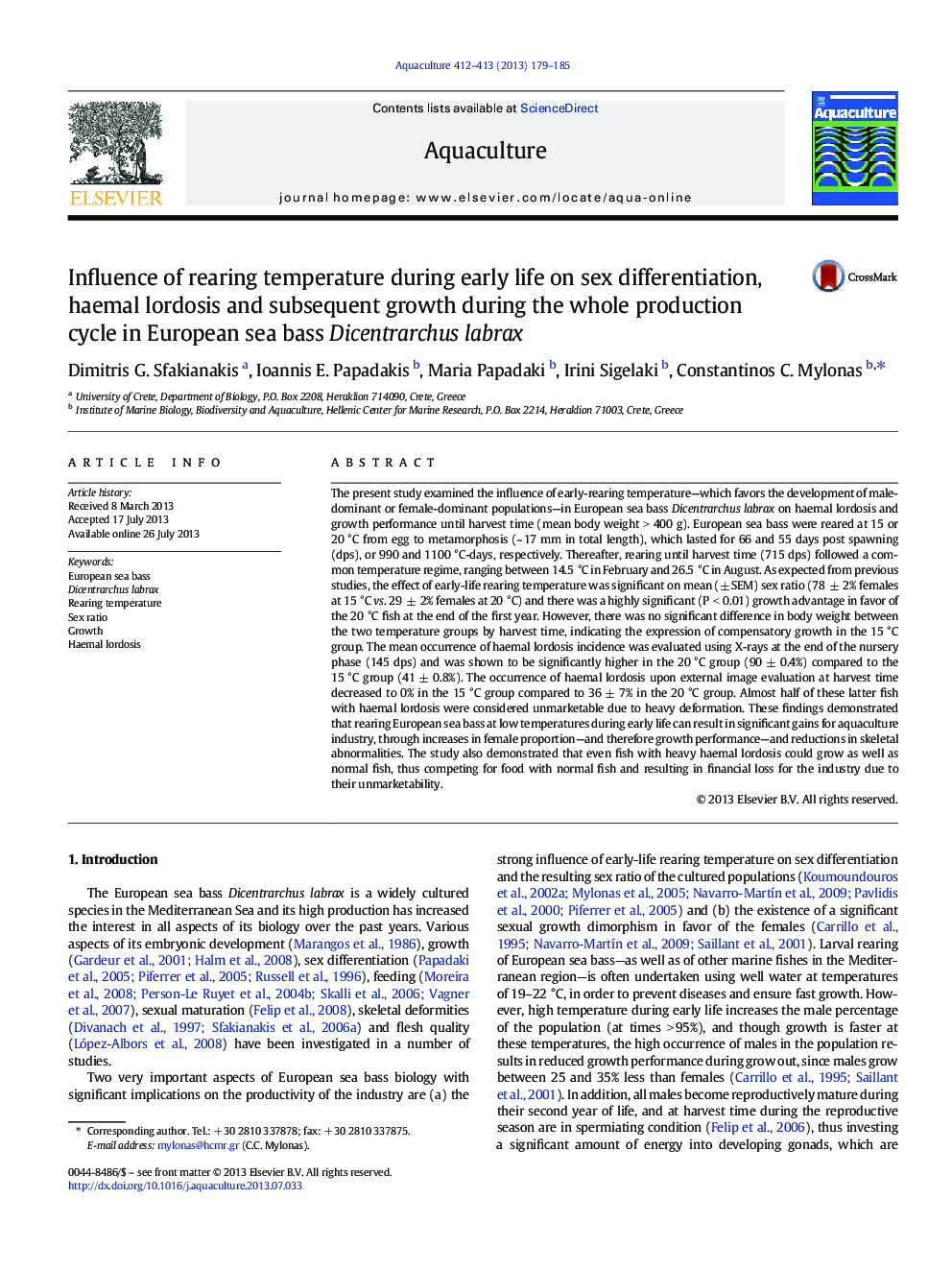| کد مقاله | کد نشریه | سال انتشار | مقاله انگلیسی | نسخه تمام متن |
|---|---|---|---|---|
| 8495533 | 1552867 | 2013 | 7 صفحه PDF | دانلود رایگان |
عنوان انگلیسی مقاله ISI
Influence of rearing temperature during early life on sex differentiation, haemal lordosis and subsequent growth during the whole production cycle in European sea bass Dicentrarchus labrax
دانلود مقاله + سفارش ترجمه
دانلود مقاله ISI انگلیسی
رایگان برای ایرانیان
کلمات کلیدی
موضوعات مرتبط
علوم زیستی و بیوفناوری
علوم کشاورزی و بیولوژیک
علوم آبزیان
پیش نمایش صفحه اول مقاله

چکیده انگلیسی
The present study examined the influence of early-rearing temperature-which favors the development of male-dominant or female-dominant populations-in European sea bass Dicentrarchus labrax on haemal lordosis and growth performance until harvest time (mean body weight > 400 g). European sea bass were reared at 15 or 20 °C from egg to metamorphosis (~ 17 mm in total length), which lasted for 66 and 55 days post spawning (dps), or 990 and 1100 °C-days, respectively. Thereafter, rearing until harvest time (715 dps) followed a common temperature regime, ranging between 14.5 °C in February and 26.5 °C in August. As expected from previous studies, the effect of early-life rearing temperature was significant on mean (± SEM) sex ratio (78 ± 2% females at 15 °C vs. 29 ± 2% females at 20 °C) and there was a highly significant (P < 0.01) growth advantage in favor of the 20 °C fish at the end of the first year. However, there was no significant difference in body weight between the two temperature groups by harvest time, indicating the expression of compensatory growth in the 15 °C group. The mean occurrence of haemal lordosis incidence was evaluated using X-rays at the end of the nursery phase (145 dps) and was shown to be significantly higher in the 20 °C group (90 ± 0.4%) compared to the 15 °C group (41 ± 0.8%). The occurrence of haemal lordosis upon external image evaluation at harvest time decreased to 0% in the 15 °C group compared to 36 ± 7% in the 20 °C group. Almost half of these latter fish with haemal lordosis were considered unmarketable due to heavy deformation. These findings demonstrated that rearing European sea bass at low temperatures during early life can result in significant gains for aquaculture industry, through increases in female proportion-and therefore growth performance-and reductions in skeletal abnormalities. The study also demonstrated that even fish with heavy haemal lordosis could grow as well as normal fish, thus competing for food with normal fish and resulting in financial loss for the industry due to their unmarketability.
ناشر
Database: Elsevier - ScienceDirect (ساینس دایرکت)
Journal: Aquaculture - Volumes 412â413, 1 November 2013, Pages 179-185
Journal: Aquaculture - Volumes 412â413, 1 November 2013, Pages 179-185
نویسندگان
Dimitris G. Sfakianakis, Ioannis E. Papadakis, Maria Papadaki, Irini Sigelaki, Constantinos C. Mylonas,